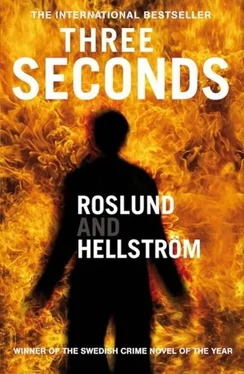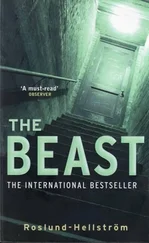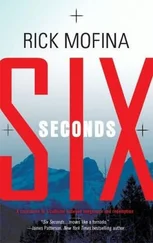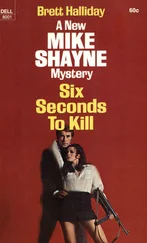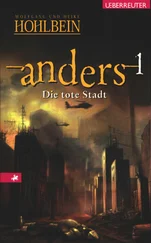"He knows that we can't shoot him from here, and behind bars, behind reinforced glass… he feels safe."
"He thinks that he's safe."
Grens looked at Edvardson.
"Thinks?"
"We can't shoot him. Not with our equipment. But it is possible."
There was a drawing lying on the large conference table in one of the corner rooms in the Government Offices. It was bright and the light from the ceiling blended with light from the high window with a view over the water at Norrström and Riddarfjärden. Fredrik Göransson smoothed the folds in the stiff paper with his hand and moved it so that it would be easier for the national police commissioner and the state secretary to see.
"Here, this building nearest the wall, is Block B. And here, on the second floor, is the workshop."
The three faces leaned over the table and, with the help of a piece of paper, studied a place they had never visited.
"So Hoffmann is standing here. Close to him, on the floor, are the hostages. A prisoner and a warden. Completely naked."
It was hard to comprehend, from the straight lines on the architect's drawing, that there was someone standing there, threatening to kill.
"According to Edvardson, he has been totally exposed in the window since the national task force arrived."
Göransson moved the files and a thick folder with the Prison and Probation Service documents from the table onto one of the chairs in order to make more space, and when that wasn't sufficient he moved the thermos and three mugs. He then unrolled a map of Aspsås district and with a felt pen drew a straight line from the squares that were the various prison buildings across the green area and open space to one of the other rectangles on the map, the one marked with a cross.
"The church. Exactly fifteen hundred and three meters away. The only place with a view that is clear enough for the snipers. And Hoffmann knows that, Edvardson is sure of it. He knows that the police don't have the equipment to reach him and that's what he's telling us by standing there."
There was a little coffee left in the thermos and the stare secretary poured herself half a cup. Then she got up and moved away, looked at her visitors and spoke in a quiet voice.
"You should have informed me yesterday."
She didn't expect an answer.
"You've maneuvered us into a corner."
She was shaking with rage. She looked at them one at a time, then lowered her voice even more.
"You have forced him to action. And now I don't have any choice, I have to act as well."
She continued to look at them as she walked toward the door. "I'll be back in fifteen minutes."
Each step had been painful, and when Ewert Grens spied the aluminum ladder that led up to a hatch in the church tower, his stiff leg protested with a series of small sharp twinges that obliterated any other thoughts. He said nothing when he slipped on the first rung, nor when his chest seemed to push up into his throat a few rungs up. His forehead shone with sweat and his arms were numb when he hauled himself through the wooden hatch and banged his head on the edge of the heavy cast iron bell, cutting himself. He lay down and managed to creep the final stretch to the door that led our onto the balcony and the cooling breeze.
They now had forty-six police officers positioned outside the prison, inside the prison, outside the church, and two up here, in the church tower-marksmen who were keeping an eye through binoculars on a window on the second floor of Block B.
"There are two possibilities. The railway bridge over there is probably a couple of hundred meters closer, but the angle is harder and the target area is too small. Whereas from here the target area is perfect. We have full view of him. But we have a problem. Our marksmen use a gun which is called a PSG 90 and is designed for firing distances of around six hundred meters. That's what our men are trained for. And the distance from here is far greater, Ewert."
Ewert Grens had gotten up and was now standing at the far end of the narrow balcony, gripping the railing with his hands. He saw the shadow again, Hoffmann's shadow.
"And what does that mean?"
"The distance is impossible. For us."
"Impossible?"
"The greatest known distance that a sniper has covered successfully is two thousand, one hundred and seventy-five meters. A Canadian marksman. ),
"So?"
"So what?"
"So it's not impossible."
"Impossible. For us."
"But it's nearly nine hundred meters less! So what's the bloody problem?" "The problem is that we have no officers who can shoot at that distance. We don't have the training. We don't have the equipment."
Grens turned toward Edvardson and the balcony shook-he was heavy and he had pulled hard at the railing.
"Who?"
"Who what?"
"Who does? Have the training? The equipment?"
"The army. They train our marksmen. They have the training. And they have the equipment."
"Then get one of them here. Now."
The balcony shook again. Ewert Grens was agitated and his ponderous body swayed as he tossed his head and stamped his foot. John Edvardson waited until he was done; he normally didn't care that much when the detective superintendent tried to look menacing.
"It doesn't work quite like that. The armed forces can't be used for police matters.
"We're talking about someone's life!"
"Statute SFS 2002:375. Ordinance on support for civil activities by the Swedish Armed Forces. I can read it for you, if you like. Paragraph seven."
"I don't give a damn about that."
"It's Swedish law, Ewert."
He had listened to them moving around on the roof, small movements, they were there the whole time, they were ready and waiting.
Then there was a crackling in his earpiece.
"The army. They train our marksmen. They have the training. And they have the equipment."
Pier Hoffmann smiled.
"Then get one of them here. Now."
He smiled again, but only inside. He was careful to stand in profile, his shoulder at a right angle to the window.
The equipment, the training, the know-how.
A sniper. A military sniper.
The map of Aspsås district was still lying on the conference table when the state secretary returned to the room and made a point of closing the door behind her.
"So, let's continue."
She had been tense and flushed when she left the room fifteen minutes ago, and whatever it was she had done, whoever it was she had spoken to, had done the trick-she looked calmer, and she was resolute and concentrated as she drank the rest of her coffee.
"The log book?"
She nodded at one of the files that had been moved from the table. "Yes?"
"Give it to me."
Göransson handed her the thick black file and she noticed as she leafed through that the pages were handwritten alternately in black and blue ballpoint pen.
Are all the meetings between your handler and this Hoffmann recorded here?"
“Yes.”
"And this is the only copy?"
"It's the copy that I keep as CHIS controller. The only one."
"Destroy it."
She put the file down on the table and pushed it over toward Göransson. "Are there any other formal links between the police authority and Hoffmann?"
Göransson shook his head.
"No. Not for him. Not for any other informant. That's not how we work." He seemed to relax a bit.
"Hoffmann has been paid by us for nine years. But only from the account that we call reward money. An account that can't be linked to personal data and therefore doesn't need to be reported to the tax authorities. He's not on any payrolls. Formally, he doesn't exist for us."
The file with the Prison and Probation Service documents was still lying on one of the chairs.
Читать дальше
